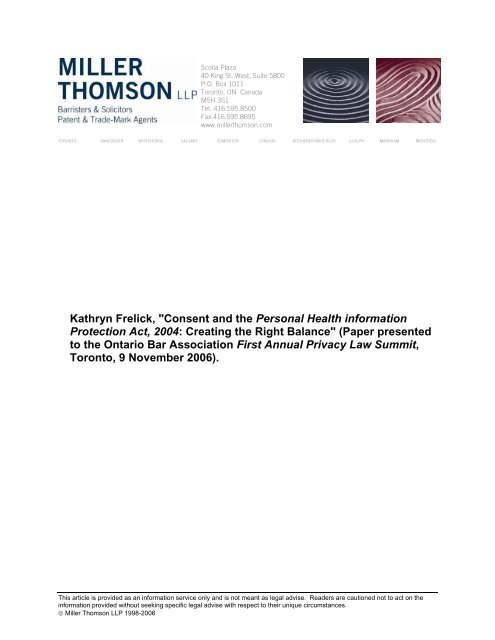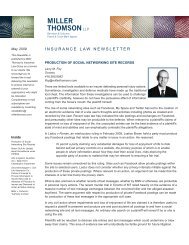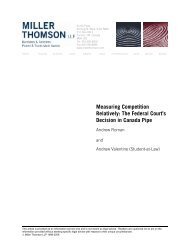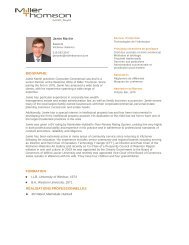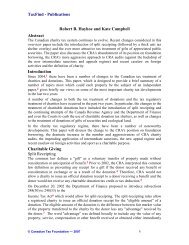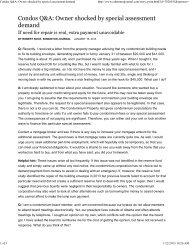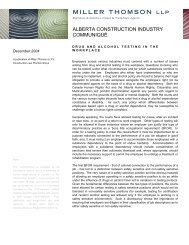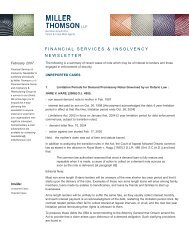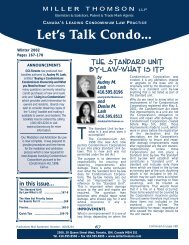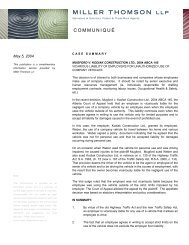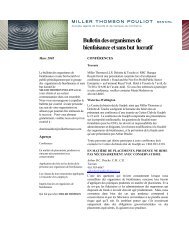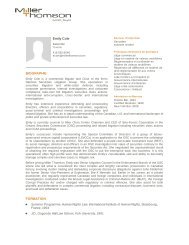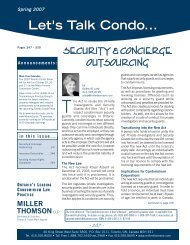"Consent and the Personal Health information ... - Miller Thomson
"Consent and the Personal Health information ... - Miller Thomson
"Consent and the Personal Health information ... - Miller Thomson
Create successful ePaper yourself
Turn your PDF publications into a flip-book with our unique Google optimized e-Paper software.
Scotia Plaza<br />
40 King St. West, Suite 5800<br />
P.O. Box 1011<br />
Toronto, ON Canada<br />
M5H 3S1<br />
Tel. 416.595.8500<br />
Fax.416.595.8695<br />
www.millerthomson.com<br />
TORONTO VANCOUVER WHITEHORSE CALGARY EDMONTON LONDON KITCHENER-WATERLOO GUELPH MARKHAM MONTRÉAL<br />
Kathryn Frelick, "<strong>Consent</strong> <strong>and</strong> <strong>the</strong> <strong>Personal</strong> <strong>Health</strong> <strong>information</strong><br />
Protection Act, 2004: Creating <strong>the</strong> Right Balance" (Paper presented<br />
to <strong>the</strong> Ontario Bar Association First Annual Privacy Law Summit,<br />
Toronto, 9 November 2006).<br />
This article is provided as an <strong>information</strong> service only <strong>and</strong> is not meant as legal advise. Readers are cautioned not to act on <strong>the</strong><br />
<strong>information</strong> provided without seeking specific legal advise with respect to <strong>the</strong>ir unique circumstances.<br />
© <strong>Miller</strong> <strong>Thomson</strong> LLP 1998-2006
CONSENT AND THE PERSONAL HEALTH INFORMATION PROTECTION ACT, 2004:<br />
CREATING THE RIGHT BALANCE <br />
Introduction<br />
The Ontario <strong>Personal</strong> <strong>Health</strong> Information Protection Act, 2004 (“PHIPA”) sets out requirements<br />
relating to personal health <strong>information</strong> (“PHI”) <strong>and</strong> <strong>the</strong> rules that govern health <strong>information</strong><br />
custodians (“HIC or HICs”) when <strong>the</strong>y collect, use <strong>and</strong> disclose that <strong>information</strong>. 1 The<br />
legislation, which came into force on November 1, 2004, adopts measures to ensure that an<br />
individual retains a measure of control over <strong>the</strong> collection, use <strong>and</strong> disclosure of his or her PHI,<br />
or <strong>information</strong>al self determination. <strong>Consent</strong> is a cornerstone of this legislation.<br />
Recognizing <strong>the</strong> difficulties in applying broad based consent rules that are not designed for this<br />
sector, including <strong>the</strong> application of <strong>the</strong> federal <strong>Personal</strong> Information Protection <strong>and</strong> Electronic<br />
Documents Act (“PIPEDA”), PHIPA applies directly to <strong>the</strong> “intricacies”of PHI <strong>and</strong> is<br />
specifically applicable to <strong>the</strong> Ontario health care sector. 2 For example, <strong>the</strong> consent provisions<br />
under PIPEDA provide that <strong>the</strong> form of consent sought by an organization will depend upon <strong>the</strong><br />
type of <strong>information</strong>. It provides that, “an organization should generally seek express consent<br />
when <strong>the</strong> <strong>information</strong> is likely to be considered sensitive”. 3 PHI is almost always considered to<br />
be sensitive in nature, which has suggested <strong>the</strong> need to obtain express consent. At face value,<br />
such a requirement would surely be an insurmountable barrier to <strong>the</strong> provision of care.<br />
Although not specifically addressed under PIPEDA, Industry Canada embraced <strong>the</strong> use of<br />
implied consent in <strong>the</strong> health care sector, relative to <strong>the</strong> exchange of PHI for health care purposes<br />
within a construct of “circle of care.” The term “circle of care”does not exist within PIPEDA,<br />
however, Industry Canada defined this term as including <strong>the</strong>, “individuals <strong>and</strong> activities related<br />
to <strong>the</strong> care <strong>and</strong> treatment of a patient. Thus, it covers <strong>the</strong> health care providers who deliver care<br />
<strong>and</strong> services for <strong>the</strong> primary <strong>the</strong>rapeutic benefit of <strong>the</strong> patient <strong>and</strong> it covers related activities such<br />
as laboratory work <strong>and</strong> professional or case consultations with o<strong>the</strong>r health care providers.” 4<br />
Importantly, PHIPA also recognizes that HICs may rely on a patient’s implied consent for<br />
disclosures of PHI to o<strong>the</strong>r HICs for <strong>the</strong> purposes of providing health care or assisting with <strong>the</strong><br />
provision of care where requirements under <strong>the</strong> Act are met. 5 Fur<strong>the</strong>r, it recognizes that<br />
specified HICs that receive PHI from an individual, substitute decision maker or ano<strong>the</strong>r HIC for<br />
<strong>the</strong> purpose of providing health care to <strong>the</strong> individual, are entitled to assume implied consent for<br />
Kathryn Frelick. Kathryn Frelick is a lawyer with <strong>the</strong> <strong>Health</strong> Industry Practice Group at <strong>Miller</strong> <strong>Thomson</strong> LLP.<br />
Kathryn would like to thank Christopher Hovias, student-at-law at <strong>Miller</strong> <strong>Thomson</strong> LLP for his assistance with<br />
this article. She also wishes to acknowledge <strong>and</strong> thank Halyna Perun for her insightful comments in reviewing<br />
this article.<br />
1 <strong>Personal</strong> <strong>Health</strong> Information Protection Act, 2004, S.O. 2004, c. 3 Sched. A [cited to PHIPA].<br />
2 Information <strong>and</strong> Privacy Commissioner, Commissioner’s PHIPA Highlights, March, 2005 at 1.<br />
3 2000, Chap. 5, Schedule 1, s. 4.3.4<br />
4 Industry Canada, PIPEDA Awareness Raising Tools (PARTs) Initiative for <strong>the</strong> <strong>Health</strong> Sector, Questions <strong>and</strong><br />
Answers, see question 12, online: <br />
5 PHIPA, s. 18(3)
–2 –<br />
<strong>the</strong> collection, use <strong>and</strong> disclosure of <strong>information</strong> for <strong>the</strong>se purposes, unless such consent is<br />
expressly withheld 6 . Imbedded in <strong>the</strong>se provisions is a construct that has developed of a “circle<br />
of care”<strong>and</strong> <strong>the</strong> recognition of <strong>the</strong> use of implied consent within this construct.<br />
PHIPA was found to be substantially similar to PIPEDA, with <strong>the</strong> Governor General in Council<br />
issuing an Order on November 28, 2005, exempting HICs that collect, use or disclose PHI within<br />
Ontario from <strong>the</strong> application of Part I of PIPEDA. PIPEDA continues to apply to <strong>the</strong> collection,<br />
use <strong>and</strong> disclosure of PHI in <strong>the</strong> course of commercial activities, beyond provincial borders, as<br />
well as personal <strong>information</strong> that is not PHI. 7 Industry Canada clarified in its Regulatory Impact<br />
Analysis Statement that it is intended for <strong>the</strong> exemption Order to apply to agents of HICs, as well<br />
as to HICs. 8<br />
In summary, while PHIPA is designed to protect <strong>the</strong> confidentiality <strong>and</strong> privacy of individuals<br />
with respect to <strong>the</strong>ir PHI, this is within <strong>the</strong> context of “facilitating <strong>the</strong> effective provision of<br />
health care.” 9 Thus, <strong>the</strong> legislation seeks to find an appropriate balance to ensure that individual<br />
consent obligations are met, without unduly burdening custodians <strong>and</strong> <strong>the</strong> health care system in<br />
providing appropriate health care. To this end, <strong>the</strong>re are a number of activities that are permitted<br />
under PHIPA that do not require consent.<br />
Application of PHIPA<br />
PHIPA applies to HICs who collect, use or disclose PHI as a result of or in connection with<br />
performing <strong>the</strong> person's or organization's powers or duties. It also applies to a person who<br />
receives PHI from a HIC. 10<br />
PHIPA recognizes that many HICs will act through agents 11 <strong>and</strong> may permit such agents to<br />
collect, use, disclose, retain or dispose of PHI on <strong>the</strong>ir behalf, subject to certain exceptions. 12<br />
For example, in <strong>the</strong> hospital setting, health care professionals including physicians, nurses <strong>and</strong><br />
allied health professionals will be agents of <strong>the</strong> hospital for <strong>the</strong> purposes of PHIPA. In this<br />
respect, <strong>the</strong> HIC remains responsible for PHI in its custody <strong>and</strong> control, including that PHI<br />
h<strong>and</strong>led by its agents.<br />
The definition of “health <strong>information</strong> custodian”is central to <strong>the</strong> application of PHIPA <strong>and</strong> is<br />
deceptively complex. It extends to specified persons or organizations that have, “custody or<br />
control over personal health <strong>information</strong> as a result of or in connection with that person or<br />
6 See for example, ss. 20(2) <strong>and</strong> 18(3), PHIPA<br />
7 Canada Gazette, Part II, Vol. 139, No. 25, December 14, 2005<br />
8 Ibid.<br />
9 PHIPA, s. 1(a)<br />
10 PHIPA, s. 7<br />
11 S. 2 of PHIPA defines "agent", in relation to a health <strong>information</strong> custodian, as “a person that, with <strong>the</strong><br />
authorization of <strong>the</strong> custodian, acts for or on behalf of <strong>the</strong> custodian in respect of personal health <strong>information</strong><br />
for <strong>the</strong> purposes of <strong>the</strong> custodian, <strong>and</strong> not <strong>the</strong> agent's own purposes, whe<strong>the</strong>r or not <strong>the</strong> agent has <strong>the</strong> authority to<br />
bind <strong>the</strong> custodian, whe<strong>the</strong>r or not <strong>the</strong> agent is employed by <strong>the</strong> custodian <strong>and</strong> whe<strong>the</strong>r or not <strong>the</strong> agent is being<br />
remunerated”<br />
12 PHIPA, s. 17(1)
–3 –<br />
organization’s powers, duties or work”. 13 Examples of HICs include: health care practitioners<br />
(except when acting as agent for ano<strong>the</strong>r HIC), hospitals, community care access centres<br />
(“CCACs”), psychiatric facilities, long term care homes, pharmacies, laboratories, ambulance<br />
services, <strong>and</strong> o<strong>the</strong>rs. It also includes a medical officer of health or board of health, <strong>the</strong> Ontario<br />
Minister of <strong>Health</strong> <strong>and</strong> Long-Term Care <strong>and</strong> <strong>the</strong> Ministry, “if <strong>the</strong> context so requires”, <strong>and</strong> any<br />
person prescribed by regulation. 14 The Act, <strong>the</strong>refore, applies broadly, affecting individuals <strong>and</strong><br />
organizations involved in <strong>the</strong> delivery of health care.<br />
While most of <strong>the</strong> enumerated groups are easily defined, <strong>the</strong>re are some categories of HICs that<br />
are more difficult to interpret. For example, a HIC includes, “a centre, program or service for<br />
community health or mental health whose primary purpose is <strong>the</strong> provision of health care.” 15<br />
This definition may be especially difficult for multi-service agencies that may operate more than<br />
one program. It requires careful examination of <strong>the</strong> definitions of “personal health <strong>information</strong>”<br />
<strong>and</strong> “health care” 16 <strong>and</strong> an analysis of <strong>the</strong> underlying purposes of <strong>the</strong> organization or particular<br />
activities.<br />
Even where PHIPA does not apply to <strong>the</strong> organization at large, <strong>the</strong>re may be health professionals<br />
working within <strong>the</strong> organization that are HICs (i.e. a HIC working for a non-HIC). For example,<br />
a school board may employ speech language pathologists who are HICs under <strong>the</strong> legislation in<br />
relation to <strong>the</strong>ir health care activities, or a large employer may operate an occupational health<br />
service. The concept of a HIC working for a non-HIC raises several concerns, including <strong>the</strong><br />
thorny issue of employers seeking <strong>the</strong> PHI of employees. Unless authorized by law, a warrant, a<br />
collective bargaining agreement, or o<strong>the</strong>r limited circumstances, a HIC must obtain <strong>the</strong> express<br />
consent of <strong>the</strong> individual when disclosing PHI to an employer.<br />
Finally, it may be difficult in some circumstances to determine whe<strong>the</strong>r a person or entity is a<br />
HIC in its own right or an agent of a HIC. For example, <strong>the</strong>re has been some debate as to<br />
whe<strong>the</strong>r or not service providers under <strong>the</strong> Long Term Care Act, 1994 are agents of a CCAC to<br />
<strong>the</strong> extent that <strong>the</strong>y are providing services through <strong>the</strong> CCAC or whe<strong>the</strong>r <strong>the</strong>y are a HIC in this<br />
context.<br />
These distinctions are important as <strong>the</strong>y determine <strong>the</strong> roles <strong>and</strong> responsibilities of <strong>the</strong> various<br />
actors under PHIPA, <strong>and</strong> also determine how <strong>the</strong>y may interact. There are different consent<br />
rules that are applicable depending upon <strong>the</strong> organization’s status under PHIPA (i.e. whe<strong>the</strong>r<br />
consent may be implied or express; whe<strong>the</strong>r <strong>the</strong> sharing PHI is a use or a disclosure 17 ). As such,<br />
it is essential that <strong>the</strong>re is a clear underst<strong>and</strong>ing of an organization’s status under <strong>the</strong> Act, in<br />
relation to any partner organizations or individuals.<br />
13 PHIPA, s. 3(1)<br />
14 PHIPA, ss. 3(1)6 <strong>and</strong> 7<br />
15 PHIPA, s. 3(1)4.vii.<br />
16 The definitions of "health care" <strong>and</strong> “personal health <strong>information</strong>”are very broad. See PHIPA, s. 2<br />
17 S. 6(1) of PHIPA clarifies that <strong>the</strong> providing of PHI between a HIC <strong>and</strong> “an agent of <strong>the</strong> custodian is a use by <strong>the</strong><br />
custodian, <strong>and</strong> not a disclosure by <strong>the</strong> person providing <strong>the</strong> <strong>information</strong> or a collection by <strong>the</strong> person to whom<br />
<strong>the</strong> <strong>information</strong> is provided”
–4 –<br />
General Rule<br />
As a general rule, a HIC is permitted to collect, use or disclose PHI with <strong>the</strong> consent of <strong>the</strong><br />
individual if it is necessary for a lawful purpose; or it may collect, use or disclose PHI without<br />
consent, as permitted or required by <strong>the</strong> Act. 18 A HIC shall not collect, use or disclose PHI if<br />
o<strong>the</strong>r <strong>information</strong> will serve <strong>the</strong> purpose <strong>and</strong> shall not collect, use or disclose more PHI than is<br />
reasonably necessary to meet <strong>the</strong> purpose, unless where required by law. 19<br />
<strong>Consent</strong> must satisfy <strong>the</strong> requirements of <strong>the</strong> Act <strong>and</strong> may be express or implied, except where<br />
<strong>the</strong> Act specifies that consent must be express. 20 While HICs have traditionally dealt with<br />
consent in relation to access <strong>and</strong> disclosure of PHI <strong>and</strong> <strong>the</strong> concept of confidentiality, 21 consent<br />
for <strong>the</strong> collection <strong>and</strong> use of PHI are newer concepts. Both federal privacy legislation <strong>and</strong><br />
PHIPA have resulted in HICs having to change <strong>the</strong> way that <strong>the</strong>y look at PHI <strong>and</strong> to address to<br />
an individual’s broader privacy rights. 22<br />
Fundamental to <strong>the</strong> concept of consent, PHIPA recognizes <strong>the</strong> right of <strong>the</strong> individual to withhold<br />
or withdraw 23 his or her consent for <strong>the</strong> collection, use or disclosure of PHI, including for health<br />
care purposes. Fur<strong>the</strong>r, section 20(2) of PHIPA provides that an individual can withhold or<br />
withdraw his or her consent to <strong>the</strong> collection, use or disclosure of his or her PHI by a HIC for <strong>the</strong><br />
purpose of providing or assisting in providing health care. The so-called “lock box”provisions<br />
under PHIPA have been particularly challenging for HICs to implement, as will be discussed in<br />
more detail below. 24<br />
PHIPA sets out a comprehensive consent regime for HICs to follow, which includes requisite<br />
elements of consent, capacity <strong>and</strong> substitute decision making. The Act sets out those situations<br />
where a HIC may collect, use or disclose PHI without consent. Finally, <strong>the</strong>re are a number of<br />
specific scenarios where PHIPA has adopted special rules for <strong>the</strong> collection, use <strong>and</strong> disclosure<br />
of PHI for particular purposes, for example, those related to fundraising <strong>and</strong> spiritual affiliation.<br />
18 PHIPA, s. 29<br />
19 PHIPA, ss. 30(1)(2) <strong>and</strong> (3)<br />
20 PHIPA, s. 18<br />
21 Confidentiality has been described as “<strong>the</strong> obligation upon an organization or person to protect <strong>information</strong> that<br />
has been entrusted in its care for a specific purpose, <strong>and</strong> to ensure that <strong>information</strong> is only accessible to those<br />
authorized to have access”.<br />
22 Privacy refers to <strong>the</strong> right of an individual to control who has access to his or her personal health <strong>information</strong> <strong>and</strong><br />
under what circumstances.<br />
23 PHIPA, s. 19<br />
24 The term lock box is not a term that is used under PHIPA. See also ss. 37(1)(a), 38(1)(a) <strong>and</strong> 50 (1)(e) of PHIPA
–5 –<br />
Requirements for Valid <strong>Consent</strong>: Section 18(1)<br />
The elements of a valid consent are set out in PHIPA <strong>and</strong> are applicable across any Act pursuant<br />
to which a HIC requires <strong>the</strong> consent of an individual for <strong>the</strong> collection, use or disclosure of<br />
PHI. 25 <strong>Consent</strong> must be: (a) consent of <strong>the</strong> individual (which includes his or her substitute<br />
decision maker, where applicable) 26 ; (b) knowledgeable; (c) related to <strong>the</strong> <strong>information</strong>; <strong>and</strong> (d)<br />
not obtained through deception or coercion.<br />
<strong>Consent</strong> is knowledgeable if it is reasonable to believe in <strong>the</strong> circumstances that <strong>the</strong> individual<br />
knows <strong>the</strong> purposes of <strong>the</strong> collection, use or disclosure, as <strong>the</strong> case may be, <strong>and</strong> that <strong>the</strong><br />
individual may provide or withhold <strong>the</strong> consent. 27 There is an objective element to this<br />
requirement as it does not require actual belief.<br />
Notice of Purposes<br />
There are a number of mechanisms by which a HIC may ensure that individuals are sufficiently<br />
“knowledgable”so as to give or withhold consent <strong>the</strong> collection, use or disclosure of <strong>the</strong>ir PHI.<br />
For example, PHIPA recognizes that, unless it is not reasonable in <strong>the</strong> circumstances, it is<br />
reasonable for a HIC to believe that an individual knows <strong>the</strong> purposes for which <strong>the</strong> HIC<br />
collects, uses or discloses PHI if <strong>the</strong> custodian, “posts or makes readily available a notice<br />
describing <strong>the</strong> purposes where it is likely to come to <strong>the</strong> individual’s attention or provides <strong>the</strong><br />
individual with such a notice.” 28<br />
The use of notice is also recognized under PIPEDA, <strong>and</strong> its adoption under PHIPA is an<br />
important communication tool, which assists in <strong>the</strong> efficient provision of care. As noted above,<br />
if a HIC wishes to rely on a notice of purposes, <strong>the</strong> notice must be posted where it is likely to<br />
come to <strong>the</strong> attention of <strong>the</strong> individual, <strong>and</strong> should include high traffic areas such as admitting<br />
<strong>and</strong> registration departments, <strong>and</strong> waiting rooms. Some organizations have opted to include such<br />
notices in <strong>the</strong>ir patient/resident/client h<strong>and</strong>books or in a special brochure. The notice must<br />
outline <strong>the</strong> purposes for which <strong>the</strong> HIC collects, uses or discloses PHI. The notice should also<br />
advise <strong>the</strong> individual that he or she has <strong>the</strong> right to give or withhold consent.<br />
The use of notice is a new concept in Ontario. After <strong>the</strong> enactment of PHIPA, stakeholders<br />
expressed concern about how much <strong>information</strong> <strong>the</strong>y should include in <strong>the</strong> notice <strong>and</strong> what<br />
<strong>information</strong> should be covered. In o<strong>the</strong>r words, how should HICs achieve <strong>the</strong> appropriate<br />
balance to ensure that individuals are informed about <strong>the</strong> organization’s <strong>information</strong> practices,<br />
but are not overwhelming individuals with too much <strong>information</strong>? The Information <strong>and</strong> Privacy<br />
Commissioner/Ontario (“IPC”) similarly expressed concern about notices being overly lengthy<br />
or complicated. The IPC noted that research performed in <strong>the</strong> United States, for example, had<br />
25 PHIPA, s. 18(1)<br />
26 S. 2 under PHIPA defines "individual", in relation to personal health <strong>information</strong>, as “<strong>the</strong> individual, whe<strong>the</strong>r<br />
living or deceased, with respect to whom <strong>the</strong> <strong>information</strong> was or is being collected or created”<br />
27 PHIPA, s. 18(5)<br />
28 PHIPA, s. 18(6)
–6 –<br />
demonstrated that members of <strong>the</strong> general public are usually irritated <strong>and</strong> repelled by excessively<br />
detailed posters <strong>and</strong> pamphlets 29 .<br />
To address <strong>the</strong>se concerns, a Short Notices Committee consisting of representative from <strong>the</strong><br />
Ontario Bar Association –Privacy <strong>and</strong> <strong>Health</strong> Law Groups, <strong>the</strong> Ministry of <strong>Health</strong> <strong>and</strong> Long<br />
Term Care, <strong>the</strong> Ontario Dental Association <strong>and</strong> <strong>the</strong> IPC was established to develop notices for<br />
<strong>the</strong> health sector. Three posters were developed entitled, In Our Hospital; In Our Facility <strong>and</strong> In<br />
Our Office. Accompanying <strong>the</strong> posters are brochures containing more <strong>information</strong> should a<br />
client wish to learn more. Finally, <strong>the</strong> committee recommended a three tiered approach to<br />
providing <strong>information</strong> about privacy as being <strong>the</strong> most effective method of communicating with<br />
clients, including:<br />
i) a short <strong>and</strong> compelling poster;<br />
ii) a pamphlet with additional <strong>information</strong>; <strong>and</strong><br />
iii) a detailed discussion with <strong>the</strong> person who is making <strong>the</strong> enquiry. 30<br />
It is recognized that all of <strong>the</strong>se steps are not required in all instances. In many cases, <strong>the</strong> notice<br />
itself will be sufficient. Many HICs have customized <strong>the</strong>ir own forms to address <strong>the</strong>ir specific<br />
needs, for example, where an organization is part of a shared electronic health system or employs<br />
particular <strong>information</strong> practices.<br />
In circumstances where a HIC may assume implied consent, it is not necessary to rely on a notice<br />
of purposes. Never<strong>the</strong>less, it is considered a best practice to utilize such notices, <strong>and</strong> to promote<br />
openness <strong>and</strong> transparency of privacy practices.<br />
Forms of <strong>Consent</strong><br />
Under PHIPA, consent for <strong>the</strong> collection, use or disclosure of PHI about an individual may be<br />
express or implied, except where <strong>the</strong> Act requires that such consent must be express. 31 The terms<br />
“express”<strong>and</strong> “implied”are not defined under PHIPA, however, express consent is taken to<br />
mean consent which is explicitly sought by <strong>and</strong> provided to <strong>the</strong> HIC, ei<strong>the</strong>r orally or in writing.<br />
Such consent is unequivocal <strong>and</strong> does not require any inference on <strong>the</strong> part of <strong>the</strong> custodian. In<br />
contrast, implied consent is consent given to a HIC implicitly. In o<strong>the</strong>r words, a HIC can<br />
reasonably imply, based on an individual’s action or inaction in particular circumstances, that<br />
consent has been given or refused.<br />
29<br />
IPC – Short Notices to <strong>the</strong> Public under <strong>the</strong> <strong>Personal</strong> <strong>Health</strong> Information Protection Act, 2004<br />
<br />
30 Ibid.<br />
31 PHIPA, ss. 18(2) <strong>and</strong> (3)
–7 –<br />
The use of “opt out”or “negative”consent, by which individuals are given <strong>the</strong> opportunity to be<br />
removed from selected or all contacts with organization also has some limited application under<br />
PHIPA, for example, in relation to fundraising. 32 In <strong>the</strong>se circumstances, unless individual takes<br />
action to opt out or say no, <strong>the</strong> custodian can assume that it has consent to proceed.<br />
Where <strong>Consent</strong> must be Express<br />
PHIPA sets out when express consent is required. For example, consent to <strong>the</strong> disclosure of PHI<br />
to a person who is not a HIC must be express. Thus, disclosures of PHI to third parties, such as<br />
lawyers, insurance companies, or police generally require express consent unless PHIPA permits<br />
<strong>the</strong> disclosure without consent or provides that implied consent is permitted. <strong>Consent</strong> must also<br />
be express where a HIC discloses PHI to ano<strong>the</strong>r HIC, if this is done for a purpose o<strong>the</strong>r than<br />
providing health care or assisting in providing health care. 33 If <strong>the</strong> collection, use or disclosure of<br />
PHI is for marketing or market research purposes, <strong>the</strong>n consent must be express. 34 Finally, when<br />
collecting, using, or disclosing PHI for fundraising activities, a HIC may imply consent, but only<br />
if <strong>the</strong> consent relates to an individual’s name <strong>and</strong> certain types of contact <strong>information</strong>. 35<br />
O<strong>the</strong>rwise, for additional <strong>information</strong> to be disclosed, consent must be express. 36<br />
Express consent is <strong>the</strong> strongest form of consent since it is unequivocal. Even where o<strong>the</strong>r forms<br />
of consent are permitted, a HIC may, at its discretion, rely upon <strong>the</strong> express consent of an<br />
individual for <strong>the</strong> collection, use or disclosure of PHI in <strong>the</strong> custody or control of <strong>the</strong> HIC 37 .<br />
Where <strong>Consent</strong> may be Implied –For <strong>Health</strong> Care Purposes<br />
HICs may rely on a patient’s implied consent for disclosures of PHI as between <strong>the</strong>mselves,<br />
provided that <strong>the</strong> requirements for consent are fulfilled <strong>and</strong> <strong>the</strong> <strong>information</strong> is being disclosed for<br />
<strong>the</strong> purposes of health care or assisting in <strong>the</strong> provision of health care. 38 This extends to any<br />
category of HIC under <strong>the</strong> Act.<br />
As a subset of this, PHIPA recognizes that certain categories of HICs who receive PHI about an<br />
individual from ano<strong>the</strong>r custodian, <strong>the</strong> individual or <strong>the</strong> individual’s substitute decision maker<br />
are “entitled to assume”that <strong>the</strong>y have implied consent for <strong>the</strong> collection, use <strong>and</strong> disclosure of<br />
PHI for <strong>the</strong> purposes of providing health care or assisting in <strong>the</strong> provision of health care. 39 This is<br />
subject to <strong>the</strong> situation where <strong>the</strong> HIC who receives <strong>the</strong> PHI is aware that <strong>the</strong> individual has<br />
expressly withheld or withdrawn <strong>the</strong>ir consent. In this event, <strong>the</strong> HIC must ei<strong>the</strong>r obtain <strong>the</strong><br />
individual’s express consent for <strong>the</strong> collection, use or disclosure of PHI, as <strong>the</strong> case may be, or<br />
alternatively, be subject to those instructions.<br />
32 See Regulation 329/04 made under PHIPA, s. 10<br />
33 PHIPA, s. 18(3)<br />
34 PHIPA, s. 33<br />
35 PHIPA, s. 32(1)(b)<br />
36 PHIPA, s. 32(1)(a)<br />
37 PHIPA, s. 6(3)(c)<br />
38 PHIPA, s. 18(3)<br />
39 PHIPA, s. 20(2)
–8 –<br />
HICs who are entitled to rely upon an assumption of implied consent in <strong>the</strong>se circumstances are<br />
generally those health providers who are directly involved in <strong>the</strong> provision of care. 40 They do<br />
not include, for example, <strong>the</strong> Ontario Ministry of <strong>Health</strong> <strong>and</strong> Long Term Care or Medical Officer<br />
of <strong>Health</strong>. Notwithst<strong>and</strong>ing that <strong>the</strong>se latter categories of HICs cannot assume implied consent;<br />
<strong>the</strong>y may still rely upon implied consent in appropriate circumstances, where it is reasonable to<br />
do so. 41<br />
Those HICs who are entitled to assume <strong>the</strong> individual’s implied consent for <strong>the</strong> collection, use<br />
<strong>and</strong> disclosure of PHI for health care purposes are sometimes referred to as <strong>the</strong> “circle of care”.<br />
This is not a defined term under PHIPA, <strong>and</strong> as such, it can be used differently by different<br />
individuals <strong>and</strong> organizations. The Hospital Privacy Toolkit describes it as follows:<br />
The term “circle of care”describes those “…individuals <strong>and</strong> entities such as health<br />
professionals, laboratories, hospitals, pharmacies”etc. “…who provide health care or<br />
assist in providing health care to a particular patient. Members of a particular patient’s<br />
“circle of care”can provide health care to <strong>the</strong> patient, confidently assuming that <strong>the</strong>y<br />
have consent to collect, use <strong>and</strong> disclose <strong>the</strong> patient’s personal health <strong>information</strong> for that<br />
care, unless <strong>the</strong>y know that <strong>the</strong> patient has expressly withheld or withdrawn consent.” 42<br />
In this regard, <strong>the</strong> circle of care is defined for each specific patient <strong>and</strong> does not automatically<br />
include people who are not involved in <strong>the</strong> care of <strong>the</strong> specific patient at <strong>the</strong> time. For example,<br />
it can be assumed that when a patient accepts a referral to, or care, diagnosis or treatment from a<br />
specific agency or health practitioner, that patient is in fact providing implied consent for <strong>the</strong><br />
collection, use <strong>and</strong> disclosure of <strong>the</strong>ir PHI.<br />
Since <strong>the</strong> term may have different interpretations, where an individual HIC uses <strong>the</strong> term “circle<br />
of care”it is prudent to define it appropriately so that it can be used consistently throughout <strong>the</strong><br />
organization. In any event, it must be consistent with <strong>the</strong> provisions of PHIPA <strong>and</strong> as such, it is<br />
better to rely upon <strong>the</strong> actual language of <strong>the</strong> Act, where possible.<br />
Implied <strong>Consent</strong> for Non-<strong>Health</strong> Care Purposes<br />
PHIPA sets out o<strong>the</strong>r situations where implied consent may be used for non-health care related<br />
purposes. For example, fundraising activities are critical to <strong>the</strong> continued operation <strong>and</strong> capital<br />
development of many health care institutions, such as hospitals, <strong>and</strong> <strong>the</strong>se organizations depend<br />
upon patients as part of <strong>the</strong>ir donor base. This important relationship has been recognized under<br />
PHIPA <strong>and</strong> special rules developed for <strong>the</strong> sharing of specific types of <strong>information</strong> for<br />
fundraising purposes. Similarly, many HICs rely upon external spiritual advisors to support<br />
clients <strong>and</strong> <strong>the</strong>ir families during times of ill health. PHIPA also addresses <strong>the</strong> important role of<br />
<strong>the</strong>se services.<br />
40 PHIPA, s. 3(1). S. 20(2) applies to those HICs described in paragraphs 1, 2, 3 or 4 of <strong>the</strong> definition in s. 3(1)<br />
41 H. Perun, M. Orr & F. Dimitriadis, Guide to <strong>the</strong> Ontario <strong>Personal</strong> <strong>Health</strong> Information Protection Act (Toronto:<br />
Irwin Law Inc., 2005) at 214.<br />
42 Hospital Privacy Toolkit: Guide to <strong>the</strong> Ontario <strong>Personal</strong> <strong>Health</strong> Information Protection Act, (Ontario Hospital<br />
Association, Ontario Hospital e-<strong>Health</strong> Council, Ontario Medical Association, Office of <strong>the</strong> Information <strong>and</strong><br />
Privacy Commissioner/Ontario <strong>and</strong> Queen’s Printer for Ontario, September 2004) at page 52
–9 –<br />
Spiritual Affiliation<br />
The provision of PHI to external clergy members is a disclosure. PHIPA contemplates that a<br />
HIC that is a facility may rely upon implied consent of <strong>the</strong> individual in order to disclose limited<br />
PHI to “a representative of a religious or o<strong>the</strong>r organization”, provided a number of conditions<br />
are met. Section 20(4) of PHIPA provides that where a patient or resident provides <strong>information</strong><br />
about his or her religious or o<strong>the</strong>r organizational affiliation, <strong>the</strong> facility is entitled to assume that<br />
it has <strong>the</strong> individual’s implied consent to provide his or her name <strong>and</strong> location in <strong>the</strong> facility to a<br />
representative of that organization. This is <strong>the</strong> only <strong>information</strong> that may be provided, however,<br />
in order to do so, <strong>the</strong> HIC must first have offered <strong>the</strong> individual <strong>the</strong> opportunity to withhold or<br />
withdraw his or her consent. 43<br />
This situation may be distinguished from <strong>the</strong> case where <strong>the</strong> facility’s health care team includes<br />
those who provide spritual care, <strong>and</strong> who are acting as agents of <strong>the</strong> HIC for <strong>the</strong> purposes of<br />
PHIPA. In <strong>the</strong>se situations, PHI may be shared with <strong>the</strong> individual, as appropriate to his or her<br />
duties, <strong>and</strong> such sharing of <strong>information</strong> is considered to be a use <strong>and</strong> not a disclosure.<br />
Involvement by members of <strong>the</strong> spiritual care team may be triggered by a referral from ano<strong>the</strong>r<br />
member of <strong>the</strong> health care team, or through a patient or resident request for spiritual services.<br />
Fundraising<br />
As outlined above, a HIC may collect, use or disclose PHI about an individual for <strong>the</strong> purpose of<br />
fundraising activities where <strong>the</strong> individual expressly consents; or <strong>the</strong> individual consents by way<br />
of an implied consent <strong>and</strong> <strong>the</strong> <strong>information</strong> consists only of <strong>the</strong> individual's or substitute decision<br />
maker’s name <strong>and</strong> mailing address, subject to prescribed requirements. 44<br />
Section 10 of Regulation 329/04 made under PHIPA sets out <strong>the</strong> circumstances upon which a<br />
HIC may rely upon implied consent in order to disclose PHI for fundraising purposes. A HIC<br />
may only be collect, use or disclose PHI for <strong>the</strong> purpose of fundraising activities undertaken for a<br />
charitable or philanthropic purpose related to <strong>the</strong> HIC's operations.<br />
Fur<strong>the</strong>r, consent under PHIPA may only be inferred where <strong>the</strong> following conditions are met:<br />
<br />
<strong>the</strong> HIC has provided a notice or statement to <strong>the</strong> individual at <strong>the</strong> time of<br />
providing service, that unless he or she requests o<strong>the</strong>rwise, <strong>the</strong> individual’s name<br />
<strong>and</strong> contact <strong>information</strong> may be disclosed <strong>and</strong> used for fundraising purposes on<br />
behalf of <strong>the</strong> HIC, toge<strong>the</strong>r with <strong>information</strong> on how <strong>the</strong> individual can easily optout<br />
of receiving any future fundraising solicitations; <strong>and</strong><br />
<strong>the</strong> individual has not opted out within 60 days<br />
<br />
all solicitations for fundraising must provide <strong>the</strong> individual with an easy way to<br />
opt-out of receiving future solicitations<br />
43 PHIPA, s. 20(4)<br />
44 PHIPA, ss. 32(1) <strong>and</strong> (2)
–10 –<br />
<br />
communications from <strong>the</strong> custodian or fundraiser must not include any<br />
<strong>information</strong> about <strong>the</strong> individual's health care or state of health<br />
Section 18(7) <strong>and</strong> Section 20(1): The Assumptions Related to <strong>the</strong> Validity of <strong>Consent</strong><br />
Assumption: <strong>Consent</strong> Valid<br />
Where a HIC has obtained or a document or has received one purporting to record consent to <strong>the</strong><br />
collection, use or disclosure of PHI, a HIC is entitled to assume that <strong>the</strong> consent fulfills <strong>the</strong><br />
requirements of PHIPA, <strong>and</strong> <strong>the</strong> individual has not withdrawn consent. The assumption,<br />
however, cannot be relied upon in circumstances where it is not reasonable to do so. 45<br />
From a practical perspective, this provision is very important as it allows HICs to proceed on <strong>the</strong><br />
basis of consent, without <strong>the</strong> necessity of “proving”that <strong>the</strong> <strong>information</strong> is valid. For example,<br />
where an individual has requested in writing that his or her PHI be provided to a third party, <strong>and</strong><br />
has provided a signed authorization to that effect, <strong>the</strong> HIC is entitled to rely upon that document,<br />
unless <strong>the</strong>re is <strong>information</strong> that would suggest it is not valid.<br />
Finally, consent to <strong>the</strong> collection, use or disclosure of PHI that has been given prior to November<br />
1, 2004 is valid if it meets <strong>the</strong> requirements for consent under PHIPA. 46<br />
Withdrawal, Limitation or Conditional <strong>Consent</strong><br />
Provisions relating to <strong>the</strong> withdrawal, limitation or placement of conditions or restrictions on<br />
consent for <strong>the</strong> collection, use <strong>and</strong> disclosure of PHI for health care purposes are a departure for<br />
many HICs. Where an individual has provided consent to <strong>the</strong> collection, use or disclosure of his<br />
or her PHI, he or she is entitled to withdraw this consent at any time, by providing notice to <strong>the</strong><br />
HIC. The withdrawal of <strong>the</strong> consent does not have retroactive effect, that is, it is only effective<br />
as of <strong>the</strong> time it is received. 47<br />
In addition, an individual may place restrictions on <strong>the</strong>ir consent. For example, a patient may<br />
permit <strong>information</strong> to be shared only with a specific organization or for a specific purpose.<br />
Importantly, even where an individual places conditions on his or her consent to have a HIC<br />
collect, use or disclose PHI, <strong>the</strong> legislation recognizes <strong>the</strong> need for a HIC to record this PHI in<br />
accordance with legal obligations, established st<strong>and</strong>ards of professional practice or institutional<br />
st<strong>and</strong>ards. 48 Thus, a health professional is obligated to maintain a complete record of PHI, which<br />
must be maintained in a manner that complies with <strong>the</strong> legislation <strong>and</strong> professional st<strong>and</strong>ards.<br />
The Act requires that where a HIC does not have <strong>the</strong> consent of <strong>the</strong> individual to disclose all of<br />
<strong>the</strong> PHI about <strong>the</strong> individual that is reasonably necessary for <strong>the</strong> provision of health care to<br />
ano<strong>the</strong>r HIC, that <strong>the</strong> o<strong>the</strong>r custodian must be notified of that fact. 49 Especially in cases where<br />
<strong>the</strong>re is concern that <strong>the</strong>re is not sufficient <strong>information</strong> for appropriate provision of care, it is<br />
45 PHIPA, s. 20(1)<br />
46 PHIPA, s. 18(7)<br />
47 PHIPA, s. 19(1)<br />
48 PHIPA, s. 19(2)<br />
49 PHIPA, s. 20(3)
–11 –<br />
essential for HICs to have an effective process to manage <strong>the</strong>se situations <strong>and</strong> to ensure that <strong>the</strong><br />
individual is fully apprised of <strong>the</strong> effect of <strong>the</strong> withdrawal or condition <strong>and</strong> potential risks. The<br />
discussion should be carefully documented in <strong>the</strong> patient’s record of PHI.<br />
Capacity <strong>and</strong> Substitute Decision Making under PHIPA<br />
Capacity to <strong>Consent</strong><br />
Under PHIPA, an individual is presumed to be capable of consenting to <strong>the</strong> collection, use or<br />
disclosure of PHI unless <strong>the</strong>re are reasonable grounds to believe that <strong>the</strong> individual is<br />
incapable. 50 Specifically, section 21(1) under PHIPA provides that an individual is capable if he<br />
or she is:<br />
(a)<br />
(b)<br />
able to underst<strong>and</strong> <strong>the</strong> <strong>information</strong> that is relevant to deciding whe<strong>the</strong>r to consent<br />
to <strong>the</strong> collection, use or disclosure, as <strong>the</strong> case may be; <strong>and</strong><br />
able to appreciate <strong>the</strong> reasonably foreseeable consequences of giving, not giving,<br />
withholding or withdrawing <strong>the</strong> consent. [Emphasis added]<br />
Case law interpreting <strong>the</strong> use of <strong>the</strong> term “capacity”under <strong>the</strong> <strong>Health</strong> Care <strong>Consent</strong> Act, 1996<br />
(“HCCA”) in <strong>the</strong> treatment context has held that it <strong>the</strong> ability to underst<strong>and</strong> <strong>and</strong> appreciate that<br />
is important in making this determination, ra<strong>the</strong>r than actual underst<strong>and</strong>ing or appreciation. 51<br />
While courts have not examined <strong>the</strong> definition of capacity under PHIPA, given <strong>the</strong> similarities in<br />
<strong>the</strong> language, it is suggested that this body of case law would be instructive for HICs making this<br />
determination.<br />
PHIPA provides that capacity may fluctuate depending upon <strong>the</strong> type of <strong>information</strong> <strong>and</strong> time<br />
that consent is sought. 52 Thus, it is important to consider <strong>the</strong> particular circumstances when<br />
making a determination of capacity.<br />
Where an individual is found to be incapable with respect to consenting to <strong>the</strong> collection, use or<br />
disclosure of his or her PHI, he or she must be informed of <strong>the</strong> finding <strong>and</strong> <strong>the</strong> consequences of<br />
<strong>the</strong> determination. 53 The individual may appeal <strong>the</strong> finding of incapacity to <strong>the</strong> <strong>Consent</strong> <strong>and</strong><br />
Capacity Board.<br />
Persons Authorized to Act as Substitute Decision Makers for Capable Individuals<br />
Unlike <strong>the</strong> HCCA, which does not permit a capable person to “delegate”<strong>the</strong>ir decision making<br />
authority, capable individuals who are sixteen years old or older may provide consent directly or<br />
may authorize in writing any capable person sixteen years of age or older to provide consent for<br />
<strong>the</strong> collection, use or disclosure of PHI on his or her behalf. 54 Formerly, <strong>the</strong> Mental <strong>Health</strong> Act<br />
50 PHIPA, ss. 21(4) <strong>and</strong> (5)<br />
51 See for example, <strong>the</strong> Supreme Court of Canada decision in Starson v. Swayze [2003] S.C.R. 722<br />
52 PHIPA, ss. 21(2) <strong>and</strong> (3)<br />
53 PHIPA, s. 22(2)<br />
54 PHIPA, s. 21(4)
–12 –<br />
had recognized <strong>the</strong> ability to designate a representative to make <strong>information</strong>al decisions, <strong>and</strong><br />
with <strong>the</strong> enactment of PHIPA, this has been given broad application across <strong>the</strong> health sector.<br />
In order to rely upon this provision, both <strong>the</strong> individual <strong>and</strong> <strong>the</strong> designate must be determined by<br />
<strong>the</strong> HIC to have capacity to make <strong>the</strong> particular decision. From a risk management perspective,<br />
it is suggested that <strong>the</strong> HIC verify <strong>the</strong> individual’s written authorization to ensure that it gives <strong>the</strong><br />
decision maker <strong>the</strong> requisite authority to make <strong>the</strong> particular decision, request or give an<br />
instruction on behalf of <strong>the</strong> capable individual. The terms of <strong>the</strong> authorization must comply with<br />
<strong>the</strong> obligations under <strong>the</strong> Act.<br />
Persons Authorized to Act as Substitute Decision Makers for Incapable Individuals<br />
Where a person has been found to be incapable with respect to <strong>information</strong>al decision making,<br />
PHIPA sets out, in order of priority, those persons who may exercise substitute decision-making<br />
authority on <strong>the</strong> individual’s behalf. 55 Before a HIC may resort to <strong>the</strong> hierarchy of decisionmakers,<br />
however, <strong>the</strong> HIC must determine if <strong>the</strong> incapable person has a substitute-decision<br />
maker under <strong>the</strong> HCCA. 56<br />
Where an individual has a substitute decision maker under treatment, admission to a care facility<br />
<strong>and</strong>/or a personal assistance service under <strong>the</strong> HCCA, that person is deemed to be <strong>the</strong> substitute<br />
decision maker of <strong>the</strong> patient in relation to <strong>the</strong> collection, use, or disclosure of PHI that is<br />
necessary for or ancillary a decision under <strong>the</strong> HCCA. 57 If this is <strong>the</strong> case, this individual ranks<br />
above any o<strong>the</strong>r person.<br />
If <strong>the</strong> incapable patient does not have a substitute decision maker authorized to make decisions<br />
under <strong>the</strong> HCCA, or where <strong>the</strong> decision does not relate to a decision under <strong>the</strong> HCCA, a HIC<br />
must refer to <strong>the</strong> list of substitute decision makers under <strong>the</strong> Act. Similar to <strong>the</strong> hierarchy set out<br />
in <strong>the</strong> HCCA, <strong>the</strong> following individuals may give, withdraw, or withhold consent on behalf of an<br />
incapable individual 58 <strong>and</strong> must do so in accordance with <strong>the</strong> principles for decision making set<br />
out in <strong>the</strong> Act 59 :<br />
<br />
<br />
<br />
<br />
The individual’s guardian of <strong>the</strong> person or guardian of property, if <strong>the</strong> consent<br />
relates to <strong>the</strong> guardian’s authority to make a decision on behalf of <strong>the</strong> individual.<br />
The individual’s attorney for personal care or attorney for property, if <strong>the</strong> consent<br />
relates to <strong>the</strong> attorney’s authority to make a decision on behalf of <strong>the</strong> individual.<br />
The individual’s representative appointed by <strong>the</strong> <strong>Consent</strong> <strong>and</strong> Capacity Board<br />
under section 27, if <strong>the</strong> representative has authority to give <strong>the</strong> consent.<br />
The individual’s spouse or partner.<br />
55 PHIPA, s. 23(1)(3)<br />
56 PHIPA, s. 26(11)<br />
57 PHIPA, ss. 5(2), (3) or (4)<br />
58 PHIPA, s. 26<br />
59 PHIPA, s. 24
–13 –<br />
<br />
<br />
<br />
<br />
A child or parent of <strong>the</strong> individual, or a children’s aid society or o<strong>the</strong>r person who<br />
is lawfully entitled to give or refuse consent in <strong>the</strong> place of <strong>the</strong> parent. This<br />
paragraph does not include a parent who has only a right of access to <strong>the</strong><br />
individual. If a children’s aid society or o<strong>the</strong>r person is lawfully entitled to<br />
consent in <strong>the</strong> place of <strong>the</strong> parent, this paragraph does not include <strong>the</strong> parent.<br />
A parent of <strong>the</strong> individual with only a right of access to <strong>the</strong> individual.<br />
A bro<strong>the</strong>r or sister of <strong>the</strong> individual.<br />
Any o<strong>the</strong>r relative of <strong>the</strong> individual.<br />
Section 26(6) sets out that, as a last resort, if no person falls under a description set out in s.<br />
26(1), <strong>the</strong>n a decision can be made by <strong>the</strong> Public Guardian <strong>and</strong> Trustee.<br />
Children<br />
There is no minimum age of consent under PHIPA. As a result, if a child meets <strong>the</strong> test for<br />
capacity, he or she is entitled to make his or her own decisions with respect to <strong>the</strong> collection, use<br />
or disclosure of PHI.<br />
If <strong>the</strong> child is over <strong>the</strong> age of sixteen, <strong>the</strong>n those provisions that are applicable to any individual<br />
apply equally to <strong>the</strong> child. In o<strong>the</strong>r words, a child who is capable <strong>and</strong> aged sixteen years or older<br />
may consent on his or her own behalf or may authorize ano<strong>the</strong>r capable person who is at least<br />
sixteen years of age to provide consent in his or her place. 60<br />
If a child is capable <strong>and</strong> less than sixteen years old, a custodial parent, a Children’s Aid Society,<br />
or a person lawfully entitled to st<strong>and</strong> in <strong>the</strong> place of a parent may also consent <strong>the</strong> collection, use<br />
or disclosure of PHI on <strong>the</strong> child’s behalf, as may <strong>the</strong> child. Such persons cannot exercise this<br />
authority if <strong>the</strong> PHI relates to treatment about which <strong>the</strong> child has made a decision on his or her<br />
own pursuant to <strong>the</strong> HCCA or counselling in which <strong>the</strong> child has participated under <strong>the</strong> Child<br />
<strong>and</strong> Family Services Act. 61<br />
Finally, if <strong>the</strong> child is capable <strong>and</strong> less than 16 years of age, <strong>and</strong> <strong>the</strong>re is a person who is entitled<br />
to act as <strong>the</strong> substitute decision-maker as set out above, a decision of <strong>the</strong> child prevails over that<br />
person in <strong>the</strong> event of a conflict. Thus, both <strong>the</strong> child <strong>and</strong> <strong>the</strong> substitute decision-maker may<br />
potentially be involved in <strong>the</strong> particular decision, however, ultimately, <strong>the</strong> child’s decision must<br />
be complied with. 62<br />
60 PHIPA, s. 23(1)1<br />
61 PHIPA, s. 23(1)2i. <strong>and</strong> ii.<br />
62 PHIPA, s. 23(3)
–14 –<br />
Deceased Persons<br />
<strong>Consent</strong> for deceased individuals for <strong>the</strong> collection, use or disclosure of <strong>information</strong> of PHI may<br />
be provided by <strong>the</strong> deceased’s estate trustee. If <strong>the</strong>re is no estate trustee, <strong>the</strong> person who has<br />
assumed responsibility for <strong>the</strong> administration of <strong>the</strong> estate may give or refuse consent. 63<br />
Where <strong>the</strong> deceased individual had a will or where it is necessary to probate an estate, it can be<br />
expected that <strong>the</strong>re is documentation relating to <strong>the</strong> appointment of an estate trustee. Where<br />
possible, a HIC should verify <strong>the</strong> authority of <strong>the</strong> estate trustee by obtaining a notarized copy of<br />
<strong>the</strong> will, a “Certificate of Appointment with a Will”or a “Certificate of Appointment of Estate<br />
Trustee without a Will”for its records. Where <strong>the</strong> HIC is obtaining consent from a “person who<br />
has assumed responsibility for <strong>the</strong> administration of <strong>the</strong> deceased’s estate”, a HIC may obtain<br />
consent from this individual if it is reasonable for to rely on <strong>the</strong> accuracy of <strong>the</strong> assertion made<br />
by that person, regarding <strong>the</strong>ir identity. 64 Depending upon <strong>the</strong> circumstances, some HICs may<br />
request additional documentation to support this contention, such as a notarized letter from <strong>the</strong><br />
individual stating that he or she has assumed this responsibility <strong>and</strong> has no knowledge of any<br />
o<strong>the</strong>r individual who is or may claim to be <strong>the</strong> estate trustee of <strong>the</strong> individual.<br />
Relying on <strong>the</strong> Assertions of Those who Claim Authority to <strong>Consent</strong><br />
PHIPA permits a HIC to rely upon <strong>the</strong> assertions of a person who claims authority to give<br />
consent under <strong>the</strong> Act “unless it is not reasonable to do so in <strong>the</strong> circumstances” 65 . A HIC may<br />
rely upon <strong>the</strong> assertion of ano<strong>the</strong>r person that consent is granted with respect to access to, or <strong>the</strong><br />
collection, use or disclosure of PHI, <strong>and</strong> specifically that:<br />
<br />
<br />
<br />
<br />
The person is entitled to consent to <strong>the</strong> collection, use or disclosure of PHI for that<br />
individual;<br />
The person is over <strong>the</strong> age of sixteen;<br />
The person is not prohibited by a court order or separation agreement from having<br />
access to <strong>the</strong> individual;<br />
No o<strong>the</strong>r person ranked higher or equally exists or if <strong>the</strong>y exist, <strong>the</strong>y would not<br />
object to <strong>the</strong> person making <strong>the</strong> decision.<br />
Notwithst<strong>and</strong>ing <strong>the</strong> above, where authority is derived pursuant to a legal document, it is prudent<br />
for a HIC to request a copy of <strong>the</strong> document for its records. Fur<strong>the</strong>rmore, a HIC may also ask<br />
questions to establish <strong>the</strong> individual’s authority <strong>and</strong> document <strong>the</strong> answers provided. Where<br />
<strong>the</strong>re is a question about <strong>the</strong> individual’s authority, a HIC must make reasonable efforts to<br />
determine <strong>the</strong> appropriate substitute decision maker before taking action on those instructions.<br />
63 PHIPA, s. 23(4)<br />
64 PHIPA, s. 20(1)<br />
65 PHIPA. s. 71(4)
–15 –<br />
Withdrawal of <strong>Consent</strong> <strong>and</strong> Express Instructions<br />
What does “Lock-Box”Mean?<br />
The term “lock-box”is not defined under PHIPA, however, it refers to <strong>the</strong> qualified right of an<br />
individual to withhold or withdraw <strong>the</strong>ir consent to <strong>the</strong> collection, use or disclosure of PHI,<br />
including for health care purposes 66 or <strong>the</strong> qualified right to provide an express instruction not to<br />
use or disclose PHI for health care purposes without <strong>the</strong> individual’s express consent. 67<br />
PHIPA recognizes that in some circumstances a HIC may need to collect, use or disclose PHI for<br />
health care purposes without consent. The lock-box provisions provide an exception to <strong>the</strong>se<br />
exceptions. Section 37(1)(a), for example, provides that a HIC, “may use PHI about an<br />
individual for <strong>the</strong> purpose for which <strong>the</strong> <strong>information</strong> was collected or created <strong>and</strong> for all <strong>the</strong><br />
functions reasonably necessary for carrying out that purpose, but not if <strong>the</strong> <strong>information</strong> was<br />
collected with <strong>the</strong> consent of <strong>the</strong> individual or under s. 36(1)(b) [indirect collection] <strong>and</strong> <strong>the</strong><br />
individual expressly instructs o<strong>the</strong>rwise.” In <strong>the</strong>se circumstances, <strong>the</strong> HIC may only use <strong>the</strong><br />
<strong>information</strong> as specified, unless it obtains <strong>the</strong> express consent of <strong>the</strong> individual.<br />
Similarly, under s. 38(1)(a), a HIC may disclose PHI about an individual to certain HICs without<br />
consent, “if <strong>the</strong> disclosure is reasonably necessary for <strong>the</strong> provision of health care <strong>and</strong> it is not<br />
reasonably possible to obtain <strong>the</strong> individual’s consent in a timely manner”. Again <strong>the</strong>re is an<br />
exception if <strong>the</strong> individual has expressly instructed <strong>the</strong> custodian not to make <strong>the</strong> dislosure.” 68<br />
Finally, section 50(1)(e) allows a HIC to disclose an individual’s PHI to a person outside of<br />
Ontario if <strong>the</strong> disclosure is reasonably necessary for <strong>the</strong> provision of health care to <strong>the</strong> individual.<br />
If <strong>the</strong> individual has expressly instructed <strong>the</strong> HIC not to make <strong>the</strong> disclosure, <strong>the</strong> HIC is<br />
prohibited from doing so.<br />
In practical terms, <strong>the</strong> ability to “lock”PHI may translate into an individual’s request that a HIC<br />
not collect, use or disclose a particular item of <strong>information</strong> contained in <strong>the</strong>ir health record (for<br />
example, a particular diagnosis), a particular part of a record or <strong>the</strong> entire contents of <strong>the</strong> health<br />
record. An individual may request that PHI not be used by certain members of <strong>the</strong> health care<br />
team or classes of health professional or disclosed to ano<strong>the</strong>r custodian, health professional (i.e.<br />
family physician) or type of health professional or agent. 69<br />
As indicated above, <strong>the</strong> ability to lock PHI is qualified, that is, an individual cannot rely on <strong>the</strong><br />
lockbox provisions where ano<strong>the</strong>r provision under PHIPA requires or permits <strong>the</strong> collection, use<br />
or disclosure of PHI without consent, for example:<br />
A HIC may use PHI where consent is not required, for example, risk management or<br />
research purposes, to find a substitute decision-maker or to verify <strong>the</strong> eligibility of a<br />
patient for provincially funded health insurance<br />
66 PHIPA, s. 20(2)<br />
67 PHIPA, ss. 37(1)(a), 38(1)(a) <strong>and</strong> 50(1)(c)<br />
68 PHIPA at s. 38(1)(a)<br />
69 Information <strong>and</strong> Privacy Commissioner/Ontario, Fact Sheet Number 8 - Lock Box, July 2005
–16 –<br />
A HIC must comply with m<strong>and</strong>atory reporting requirements, such as reporting a child in<br />
need of protection under <strong>the</strong> Child <strong>and</strong> Family Services Act <strong>and</strong> reporting communicable<br />
<strong>and</strong> reportable diseases under <strong>the</strong> <strong>Health</strong> Protection <strong>and</strong> Promotion Act<br />
An express instruction may be overridden if a custodian believes on reasonable grounds<br />
that disclosure of PHI is necessary for <strong>the</strong> purpose of eliminating or reducing a significant<br />
risk of serious bodily harm to a person or group of persons 70<br />
A HIC must notify ano<strong>the</strong>r health care provider to whom <strong>the</strong> individual’s PHI has been<br />
disclosed where it is believed that <strong>the</strong> individual has not consented to <strong>the</strong> disclosure of all<br />
PHI that is reasonably necessary for <strong>the</strong> provision of care to <strong>the</strong> individual. Where this is<br />
<strong>the</strong> case, <strong>the</strong> recipient custodian may follow up with <strong>the</strong> individual to seek express<br />
consent 71<br />
There may be occasions where a HIC believes that <strong>the</strong> individual cannot be treated safely due to<br />
insufficient <strong>information</strong>. In <strong>the</strong> interests of patient safety, for example, <strong>the</strong> College of Physicians<br />
<strong>and</strong> Surgeons of Ontario recognizes that a physician may refuse to treat a patient based on lack<br />
of <strong>information</strong>, but only in non-emergency situations. 72 It is incumbent upon a custodian to<br />
ensure that <strong>the</strong> individual is aware of <strong>the</strong> risks associated with “locking”PHI <strong>and</strong> that this may<br />
have an adverse impact upon <strong>the</strong> quality of care provided.<br />
Duties Arising from “Lock Box”Requests<br />
Lock box requests are one of <strong>the</strong> most challenging aspects of PHIPA for many HICs, particularly<br />
in <strong>the</strong> realm of electronic health records. Technology has outpaced regulatory efforts, with <strong>the</strong><br />
effect that many HICs lack <strong>the</strong> technical ability to effectively manage requests to withdraw,<br />
withhold or restrict PHI. Never<strong>the</strong>less, <strong>the</strong> lock box provisions of PHIPA are fully operational<br />
<strong>and</strong> HICs must comply with requests made, subject to <strong>the</strong>ir technical <strong>and</strong> logistical limitations.<br />
The IPC has suggested that compliance with <strong>the</strong> lock-box provisions can be achieved through:<br />
Policies, procedures or manual processes;<br />
Electronic or technological means; or<br />
A combination of policies, procedures or manual processes <strong>and</strong> technological means. 73<br />
There are a number of strategies that a HIC may employ to implement lock box requests <strong>and</strong> to<br />
manage <strong>the</strong> risk. For example, a HIC would be well advised to ensure that any requests to<br />
withhold, withdraw or restrict <strong>the</strong> collection, use or disclosure of PHI be made in writing. Where<br />
<strong>the</strong>re are significant restrictions, <strong>the</strong>re should be a process to explore <strong>the</strong> reasons for <strong>the</strong> request,<br />
discuss <strong>the</strong> implications <strong>and</strong> risks associated with such a decision, <strong>the</strong> limitations of <strong>the</strong> lock-box<br />
provisions, as well as logistical or technical implications of <strong>the</strong> provider in managing <strong>the</strong> request<br />
70 PHIPA, s. 40<br />
71 PHIPA, s. 20(3)<br />
72 The College of Physicians <strong>and</strong> Surgeons of Ontario, Confidentiality of <strong>Personal</strong> <strong>Health</strong> Information, Policy #8-05<br />
73 Supra, note 60 at 3.
–17 –<br />
(i.e. need to manually separate <strong>the</strong> record or need to place confidentiality flags <strong>and</strong>/or monitor<br />
access). A waiver or release setting out this <strong>information</strong> may also be obtained from <strong>the</strong><br />
individual.<br />
Some HICs convene a specially devised review team to assess potential risks associated with<br />
locking a patient’s health record. This is followed by a meeting with <strong>the</strong> individual to review <strong>the</strong><br />
risk assessment <strong>and</strong> <strong>the</strong> manner in which paper <strong>and</strong>/or electronic health records may be managed<br />
to accommodate <strong>the</strong> request.<br />
‘Lock-Box’Case Study: Order HO-002<br />
In July of 2006, <strong>the</strong> IPC released its second order relative to PHIPA which sheds light on several<br />
issues, including <strong>the</strong> lock-box provisions under PHIPA <strong>and</strong> responsibilities that a HIC has<br />
relative to its agents 74 . In this case, a patient made a complaint to <strong>the</strong> IPC with respect to<br />
unauthorized access to her hospital electronic health record (“EHR”).<br />
The IPC investigation found that at <strong>the</strong> time of her admission, <strong>the</strong> patient had informed hospital<br />
staff that she did not wish her estranged husb<strong>and</strong>, an employee of <strong>the</strong> hospital, or his girlfriend,<br />
who worked <strong>the</strong>re as a nurse, to be aware of her hospitalization or to access her PHI. The patient<br />
was in <strong>the</strong> midst of divorce proceedings, <strong>and</strong> following her discharge, she learned through<br />
conversations with her estranged husb<strong>and</strong> that details of her treatment had been disclosed. The<br />
patient filed a complaint with <strong>the</strong> hospital.<br />
Upon receiving <strong>the</strong> complaint, <strong>the</strong> hospital took immediate steps to “flag”<strong>the</strong> patient’s EHR <strong>and</strong><br />
conducted an audit of all access to her record. The audit confirmed that <strong>the</strong> nurse in question had<br />
inappropriately accessed <strong>the</strong> patient’s record. Despite <strong>the</strong> confidentiality flag on <strong>the</strong> patient’s<br />
EHR, <strong>and</strong> <strong>the</strong> ongoing investigation, it was discovered that <strong>the</strong> nurse inappropriately accessed<br />
<strong>the</strong> patient’s EHR on three fur<strong>the</strong>r occasions after <strong>the</strong> patient had complained to <strong>the</strong> hospital.<br />
The IPC found that <strong>the</strong> hospital failed to take reasonable steps to safeguard <strong>the</strong> patient’s PHI.<br />
Despite <strong>the</strong> fact that <strong>the</strong> nurse blatantly disregarded <strong>the</strong> hospital’s policies, she was none<strong>the</strong>less<br />
an agent of <strong>the</strong> hospital, <strong>and</strong> as such, it had an obligation to ensure that <strong>the</strong> patient’s PHI was<br />
protected. 75 The IPC commented that <strong>the</strong> agency provisions under PHIPA, “would be rendered<br />
meaningless if a person who would usually be an agent is converted to a non-agent in <strong>the</strong> event<br />
that <strong>the</strong>y act improperly”. 76<br />
With respect to <strong>the</strong> hospital’s lock-box requirements, after <strong>the</strong> patient complained to <strong>the</strong><br />
hospital’s privacy officer, a “VIP flag”was placed on <strong>the</strong> patient’s EHR which notified those<br />
accessing <strong>the</strong> computer records that access to <strong>the</strong> file was being monitored. While not<br />
preventing access to be made, <strong>the</strong>se types of flags are designed to ensure that any privacy<br />
breaches can be quickly identified <strong>and</strong> dealt with. 77 The IPC recognized that <strong>the</strong> “VIP flag”<br />
system, which notifies users of potential privacy breaches, is an acceptable practice <strong>and</strong> meets<br />
<strong>the</strong> controls necessary to ensure respect for <strong>the</strong> ‘lock-box’provisions. The IPC fur<strong>the</strong>r observed<br />
74 Information <strong>and</strong> Privacy Commissioner/Ontario, Order HO-002, July 2006<br />
75 Ibid. at 6<br />
76 Ibid. at 6<br />
77 Ibid at 13
–18 –<br />
that “<strong>the</strong> rationale for not incorporating stricter access controls into clinical <strong>information</strong> systems<br />
that are typically used in hospitals is that if relevant <strong>information</strong> is not readily available in an<br />
emergency situation, this could pose a risk to a patient’s health <strong>and</strong> safety.” 78<br />
Having said this, <strong>the</strong>se types of mechanisms must be used in conjunction with appropriate<br />
policies <strong>and</strong> procedures, including a privacy breach protocol that coordinates <strong>the</strong> privacy <strong>and</strong><br />
human resources components of <strong>the</strong> investigation. The IPC stated that while human resources<br />
protocols are important, patient privacy is <strong>the</strong> paramount consideration. 79<br />
Collecting, Using, <strong>and</strong> Disclosing <strong>Personal</strong> <strong>Health</strong> Information without <strong>Consent</strong><br />
As stated above, <strong>the</strong> general principle under PHIPA provides that PHI may only be collected,<br />
used or disclosed with <strong>the</strong> consent of <strong>the</strong> individual, or as permitted or required under <strong>the</strong> Act.<br />
PHIPA was not intended to replace all existing legislation with respect to <strong>the</strong> use <strong>and</strong> disclosure<br />
of PHI, <strong>and</strong> for <strong>the</strong> most part, preserves, updates <strong>and</strong> broadens <strong>the</strong> application of such provisions<br />
so that <strong>the</strong>y are applied consistently within <strong>the</strong> health sector. Fur<strong>the</strong>rmore, <strong>the</strong> legislation<br />
recognizes that <strong>the</strong>re are situations where obtaining consent for <strong>the</strong> collection, use or disclosure<br />
of PHI may not be possible or appropriate <strong>and</strong> it adopts special provisions, where, for public<br />
policy reasons, such activities do not require consent.<br />
Where a provision allowing disclosure under PHIPA is permissive, a HIC is not required to<br />
disclose <strong>the</strong> PHI unless required to do so by law; nor is <strong>the</strong> HIC relieved from a legal<br />
requirement to disclose <strong>the</strong> <strong>information</strong>. 80 Finally, it does not prevent <strong>the</strong> HIC from obtaining<br />
<strong>the</strong> individual's consent for <strong>the</strong> disclosure 81 <strong>and</strong> <strong>the</strong>re are many reasons why a custodian, for<br />
policy reasons may set its own internal rules with respect to different types of PHI. For example,<br />
a psychiatric facility may develop more stringent requirements for disclosure of sensitive PHI<br />
than required under <strong>the</strong> Act.<br />
Permissible Forms of Indirect Information Collection without <strong>Consent</strong><br />
PHIPA sets out those circumstances where a HIC may collect <strong>information</strong> about an individual<br />
from a source o<strong>the</strong>r than <strong>the</strong> person to whom <strong>the</strong> <strong>information</strong> relates. For example, indirect<br />
collection of PHI without consent is permitted if such <strong>information</strong> is reasonably necessary for <strong>the</strong><br />
provision of health care, <strong>and</strong> it is not reasonably possible to collect PHI <strong>the</strong> <strong>information</strong> directly<br />
from <strong>the</strong> patient. 82 This may be because <strong>the</strong> <strong>information</strong> cannot be relied on as accurate, 83 for<br />
example, where <strong>the</strong> individual is disoriented or confused or suffering from a mental disorder<br />
which affects his or her perception. Secondly, a HIC may need to collect <strong>information</strong> from o<strong>the</strong>r<br />
sources where <strong>the</strong> <strong>information</strong> cannot be obtained directly from <strong>the</strong> individual “in a timely<br />
78 Ibid. at 14<br />
79 Ibid. at 15<br />
80 PHIPA, ss. 6(3)(a) <strong>and</strong> (b)<br />
81 PHIPA, s. 6(3)(c)<br />
82 PHIPA, s. 36(1)(b)<br />
83 PHIPA, s. 36(1)(b)(i)
–19 –<br />
manner”, 84 for example, where an individual is unconscious <strong>and</strong> a substitute decision maker<br />
cannot be located.<br />
There are o<strong>the</strong>r examples of indirect collection of PHI, for example, by a HIC that is an<br />
institution under <strong>the</strong> Freedom of Information <strong>and</strong> Protection of Privacy Act or Municipal<br />
Freedom of Information <strong>and</strong> Protection of Privacy Act, for <strong>the</strong> purposes of conducting a<br />
proceeding, investigating a breach of agreement or law, or its statutory function. 85 In addition,<br />
HIC may collect PHI from a person who is not a HIC where <strong>the</strong> custodian is carrying out<br />
research. 86 There are also situations where PHI is collected from a person who is permitted or<br />
required by law to disclose it to <strong>the</strong> HIC, for example, <strong>information</strong> forming <strong>the</strong> basis for a Form<br />
1, Application for Psychiatric Assessment under <strong>the</strong> Mental <strong>Health</strong> Act may come from a<br />
number of different sources. 87 Finally, a HIC may be permitted or required by law to collect <strong>the</strong><br />
PHI indirectly, for example, <strong>the</strong> medical officer of health, as a HIC, is required to collect PHI<br />
under <strong>the</strong> <strong>Health</strong> Protection <strong>and</strong> Promotion Act relative to communicable <strong>and</strong> reportable<br />
diseases. 88<br />
Permitted Uses without <strong>Consent</strong><br />
PHIPA authorizes a HIC to use PHI that it is collected for health care purposes <strong>and</strong> for specified<br />
secondary purposes, where it would not be practicable or reasonable to seek permission from <strong>the</strong><br />
individual or <strong>the</strong> use is consistent with certain public policy goals. 89 Section 37(1)(a) provides<br />
that a HIC may use PHI without consent of <strong>the</strong> individual, “for <strong>the</strong> purpose for which <strong>the</strong><br />
personal health <strong>information</strong> was collected or created”, <strong>and</strong> “for all functions reasonably<br />
necessary for carrying out that purpose”, subject to any express instructions to <strong>the</strong> contrary.<br />
There are a number of secondary purposes for which use of PHI is permitted without consent,<br />
including: <strong>the</strong> planning or delivery of health programs or services 90 , obtaining payment,<br />
processing, monitoring, verifying or reimbursing claims for payment, 91 <strong>and</strong> risk or error<br />
management to improve or maintain <strong>the</strong> quality of programs or services. 92 Use of PHI for <strong>the</strong><br />
“purpose of educating agents to provide health care 93 , <strong>and</strong> for use in a legal proceeding or<br />
contemplated proceeding in which <strong>the</strong> HIC or agent is a party or witness are also permitted 94 .<br />
PHI may also be used for research purposes, provided that <strong>the</strong> HIC has fulfilled <strong>the</strong> requirements<br />
84 PHIPA, s. 36(1)(b)(ii)<br />
85 PHIPA, s. 36(1)(c)<br />
86 PHIPA, s. 36(1)(d)<br />
87 PHIPA, s. 36(1)(g)<br />
88 PHIPA, s. 36(1)(g), Supra note 36 at 306<br />
89 Supra note 36 at 316<br />
90 PHIPA, s. 37(1)(c)<br />
91 PHIPA, s. 37(1)(i)<br />
92 PHIPA, s. 37(1)(d)<br />
93 PHIPA, s. 37(1)(e)<br />
94 PHIPA, s. 37(1)(h)
–20 –<br />
of <strong>the</strong> Act, including preparation of a research plan; approval of <strong>the</strong> research by a research ethics<br />
board; <strong>and</strong> written agreement. 95<br />
Permitted Disclosures without <strong>Consent</strong><br />
The Act permits <strong>the</strong> disclosure of PHI to particular HICs where such disclosure is reasonably<br />
necessary for providing health care <strong>and</strong> consent cannot be obtained in a timely way. This is<br />
subject to express instructions from <strong>the</strong> individual. 96 O<strong>the</strong>r circumstances of permissible<br />
disclosure include <strong>the</strong> following:<br />
<br />
<br />
<br />
<br />
<br />
where <strong>the</strong>re are reasonable grounds to believe disclosure is necessary to eliminate<br />
or reduce a significant risk or serious bodily harm to a person or group of<br />
persons. 97 Reference may also be had to <strong>the</strong> common law duty to warn, health<br />
professional st<strong>and</strong>ards that recognize <strong>the</strong> duty to warn <strong>and</strong> m<strong>and</strong>atory reporting<br />
requirements under existing legislation<br />
for a proceeding or contemplated proceeding in which <strong>the</strong> HIC or agent is a party<br />
or witness if it relates to a matter at issue 98<br />
pursuant to a warrant, subpoena, summons, court order or similar requirement, in<br />
which case, only <strong>the</strong> <strong>information</strong> specified ought to be provided. Where a<br />
summons or subpoena is received, no PHI ought to be disclosed until authorized<br />
by a court or administrative tribunal<br />
where disclosure is to a researcher for <strong>the</strong> purpose of research <strong>and</strong> a HIC has<br />
received written application, a research plan that satisfies <strong>the</strong> Act, a copy of <strong>the</strong><br />
Research Ethics Board decision, <strong>and</strong> enters into an agreement with <strong>the</strong> researcher<br />
that satisfies <strong>the</strong> Act 99<br />
where disclosure is to a person who is carrying out an inspection, investigation or<br />
procedure authorized by warrant or by law. 100 This provision does not provide<br />
independent authority directing HICs to disclose PHI to police or law<br />
enforcement authorities without consent. Ra<strong>the</strong>r, it reinforces that a HIC may<br />
provide PHI to a law enforcement agency in accordance with a warrant or<br />
statutory powers of investigation, for example, <strong>the</strong> disclosure of PHI to a Coroner<br />
or a police officer authorized by <strong>the</strong> Coroner in <strong>the</strong> exercise of powers under <strong>the</strong><br />
Coroners Act<br />
95 PHIPA, s. 37(1)(j)<br />
96 PHIPA, s. 38(1)(a)<br />
97 PHIPA, s. 40<br />
98 PHIPA, s.41<br />
99 PHIPA, s. 44<br />
100 PHIPA, s. 43(1)(g)
–21 –<br />
<br />
<br />
<br />
<br />
<br />
<br />
<br />
where disclosure is to <strong>the</strong> Chief Medical Officer of <strong>Health</strong> or a Medical Officer of<br />
<strong>Health</strong> for <strong>Health</strong> Protection <strong>and</strong> Promotion Act purposes 101<br />
where disclosure is to a regulatory college for purposes of enforcement of <strong>the</strong><br />
Drug <strong>and</strong> Pharmacies Regulation Act, Regulated <strong>Health</strong> Professions Act, 1991 or<br />
an Act mentioned in Schedule 1 to <strong>the</strong> Regulated <strong>Health</strong> Professions Act, 1991 102<br />
disclosure of <strong>information</strong> to <strong>the</strong> Public Guardian <strong>and</strong> Trustee, Children’s Lawyer<br />
or Children’s Aid Society so that <strong>the</strong>y can carry out <strong>the</strong>ir statutory functions 103<br />
a HIC that is a facility that provides health care may disclose <strong>the</strong> fact that an<br />
individual is a patient or resident in a facility; <strong>the</strong> individual’s general health<br />
status described as critical, poor, fair, stable or satisfactory (or similar terms); <strong>and</strong><br />
<strong>the</strong> location of <strong>the</strong> individual in <strong>the</strong> facility. 104 Disclosure may only be made if <strong>the</strong><br />
HIC has given <strong>the</strong> individual <strong>the</strong> first reasonable opportunity to object to such a<br />
disclosure <strong>and</strong> <strong>the</strong> individual has not objected. This section refers to an individual<br />
who has been “admitted”to <strong>the</strong> facility, <strong>and</strong> as such, its application is somewhat<br />
limited.<br />
For <strong>the</strong> purpose of contacting a relative, friend or potential substitute decisionmaker<br />
of <strong>the</strong> individual, if <strong>the</strong> individual is injured, incapacitated or ill <strong>and</strong> unable<br />
to give consent personally 105<br />
Where <strong>the</strong> patient is deceased, or is reasonably suspected to be deceased, for <strong>the</strong><br />
purpose of identifying <strong>the</strong> individual <strong>and</strong> for <strong>the</strong> purpose of informing any person<br />
whom it is reasonable to inform in <strong>the</strong> circumstances of <strong>the</strong> circumstances 106<br />
To <strong>the</strong> Workplace Safety <strong>and</strong> Insurance Board where <strong>the</strong> patient has a claim or<br />
open case 107<br />
Where Disclosure is Permitted in Emergency or Urgent Circumstances<br />
The IPC notes that while PHI is protected by privacy <strong>and</strong> access laws in Ontario, “it is also<br />
important to realize that <strong>the</strong>se protections are not intended to st<strong>and</strong> in <strong>the</strong> way of <strong>the</strong> disclosure<br />
of vital – <strong>and</strong> in some cases, life-saving – <strong>information</strong> in emergency or o<strong>the</strong>r urgent<br />
situations.” 108 The disclosure of PHI is permissible in “emergency <strong>and</strong> limited o<strong>the</strong>r situations”,<br />
101 PHIPA, s. 43(1)(h)<br />
102 PHIPA, s. 43(1)(b)<br />
103 PHIPA, s. 43(1)(e)<br />
104 PHIPA, s. 38(3)<br />
105 PHIPA, s. 38(1)(c)<br />
106 PHIPA, s. 38(4)<br />
107 PHIPA, s. 43(1)(h)<br />
108 IPC, Fact Sheet: Disclosure of Information Permitted in Emergency or o<strong>the</strong>r Urgent Circumstances, Number 7<br />
July 2005 at 1
–22 –<br />
where a person’s consent has not been obtained if <strong>the</strong> <strong>information</strong> comes from, in <strong>the</strong> case of <strong>the</strong><br />
health care sector, a HIC or someone acting on behalf of <strong>the</strong> HIC.<br />
Under PHIPA, a HIC may disclose PHI if <strong>the</strong> HIC believes on reasonable grounds that <strong>the</strong><br />
disclosure is necessary to eliminate or reduce a “significant risk of serious bodily harm to a<br />
person or group of persons… Such circumstances would even override an individual’s prior<br />
express instructions not to disclose <strong>the</strong> relevant personal health <strong>information</strong>.” 109 For example, if a<br />
health care practitioner’s client was at risk of committing suicide, <strong>the</strong> health care practitioner<br />
could disclose <strong>the</strong> client’s PHI to that client’s family or physician if <strong>the</strong>re were reasonable<br />
grounds to believe that such disclosure was necessary to reduce <strong>the</strong> risk of suicide. 110<br />
The disclosure of harm provision under PHIPA can also be read in conjunction with <strong>the</strong> common<br />
law duty to warn <strong>and</strong> health professional obligations. For example, <strong>the</strong> College of Physicians<br />
<strong>and</strong> Surgeons recognizes a duty to inform or a duty to warn. For example, where a physician has<br />
reason to believe that a patient will carry out threats of violence against a specific person or<br />
group of persons, <strong>the</strong> physician should report details of <strong>the</strong> threat to police or in some instances,<br />
<strong>the</strong> intended victim. Reports generally include <strong>the</strong> threat, <strong>the</strong> situation, <strong>the</strong> clinician’s opinion<br />
<strong>and</strong> <strong>the</strong> <strong>information</strong> upon which <strong>the</strong> opinion is based. 111<br />
The Supreme Court of Canada 112 has also provided some useful guidelines in terms of when a<br />
duty to warn may be triggered, recognizing that this will involve a professional judgment on <strong>the</strong><br />
part of <strong>the</strong> clinician:<br />
1. Identifiable: <strong>the</strong>re is a clear risk to an identifiable person or group of persons<br />
2. Seriousness: <strong>the</strong>re is a risk of serious bodily harm or death; <strong>and</strong><br />
3. Imminence: <strong>the</strong> danger is imminent.<br />
M<strong>and</strong>atory Disclosure<br />
The above scenarios sketch out <strong>the</strong> circumstances when disclosure is permissible. There are also<br />
a number of situations where a HIC has a legal obligation to disclose PHI to specified entities.<br />
Examples include <strong>the</strong> reporting of:<br />
<br />
<br />
<br />
suspected child abuse or neglect under <strong>the</strong> Child <strong>and</strong> Family Services Act to a<br />
Children’s Aid Society;<br />
health conditions that make it dangerous for an individual to drive to <strong>the</strong> Ministry<br />
of Transportation;<br />
certain deaths to <strong>the</strong> Coroner;<br />
109 Ibid. at 2<br />
110 Ibid., See also PHIPA, s. 40(1)<br />
111<br />
The College of Physicians <strong>and</strong> Surgeons of Ontario, M<strong>and</strong>atory Reporting Policy #3-05, published<br />
January/February 2006<br />
112 Smith v. Jones, [1999] S.C.J. No. 15 (S.C.C.)
–23 –<br />
<br />
<br />
<br />
communicable <strong>and</strong> reportable diseases to <strong>the</strong> Medical Officer of <strong>Health</strong>;<br />
sexual abuse by a health professional or termination of employment or privileges<br />
for reasons of incapacity, incompetence or professional misconduct;<br />
loss or <strong>the</strong>ft of narcotics or targeted substance under <strong>the</strong> federal Controlled Drugs<br />
<strong>and</strong> Substances Act<br />
In all of <strong>the</strong>se situations, <strong>the</strong> HIC ought to ensure that it clearly follows <strong>the</strong> statutory<br />
requirements in carrying out <strong>the</strong> disclosure.<br />
Conclusion:<br />
As with o<strong>the</strong>r privacy legislation, consent is clearly central to PHIPA. The Act seeks to achieve<br />
an appropriate balance between individual privacy rights <strong>and</strong> <strong>the</strong> need to ensure that <strong>the</strong>re is<br />
appropriate <strong>and</strong> necessary communication in <strong>the</strong> provision of health care, <strong>and</strong> for those<br />
secondary functions ancillary to <strong>the</strong> provision of health care.


